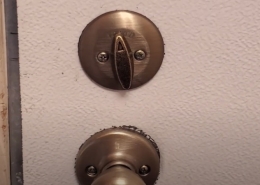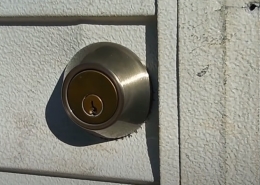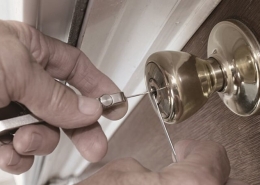Single vs. Double Cylinder Deadbolt: Key Difference and How to Choose?
Introduction
Deadbolts have long been a staple in home security, offering a robust line of defense against potential intruders. At the heart of this security measure lies a choice homeowners often face: should they opt for a single-cylinder or a double-cylinder deadbolt?
This article delves into the nuances of these two deadbolts, shedding light on their features, benefits, and potential drawbacks. By understanding the distinctions between single-cylinder and double-cylinder deadbolts, homeowners can make informed decisions that best suit their security needs and lifestyle.
What’s the Key difference between Single vs. Double Cylinder Deadbolt?
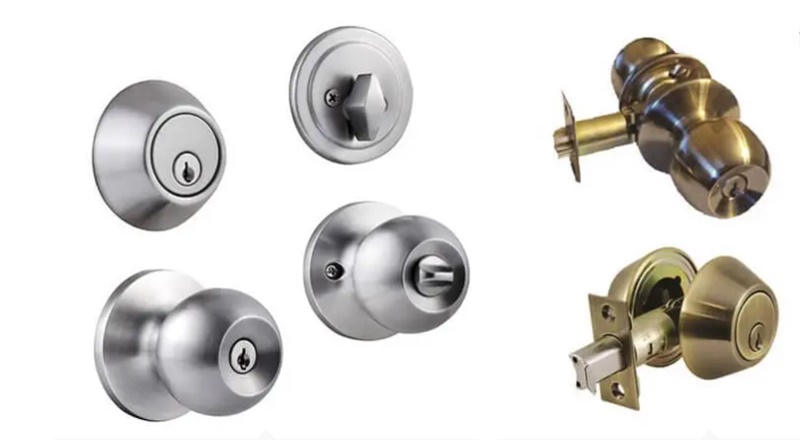
The key difference between a single-cylinder deadbolt and a double-cylinder deadbolt lies in how they are operated and their level of security:
- Single Cylinder Deadbolt:
- Single-cylinder deadbolts are the most common type of deadbolt used in residential settings.
- They have a key cylinder on the exterior side of the door and a thumbturn (a knob or lever) on the interior side.
- To unlock a single-cylinder deadbolt from the inside, turn the thumbturn. From the outside, it requires a key.
- These deadbolts are convenient for quick exit in an emergency because you can easily turn the thumbturn to unlock the door without needing a key.
- Double Cylinder Deadbolt:
- Double-cylinder deadbolts have key cylinders on the door’s exterior and interior sides.
- Having a key to unlock and lock the deadbolt from both sides.
- They provide a higher level of security than single-cylinder deadbolts because even if a potential intruder can break the glass on the door or reach through a window to access the thumbturn, they won’t be able to unlock the door without the key.
- However, they can pose a safety concern in emergencies because you need a key to unlock the door from the inside, which can slow down your exit.
Single-cylinder deadbolts are more convenient for everyday use and emergency exits, while double-cylinder deadbolts offer enhanced security but may require a key for entry and exit.
It’s important to consider your security requirements and any local building codes or regulations that may influence your choice. Some people opt for a compromise by using a single-cylinder deadbolt with additional security features, such as reinforced strike plates or longer screws, to enhance security without sacrificing emergency exit convenience.
Advantages and Disadvantages
Both single-cylinder and double-cylinder deadbolts have unique advantages and disadvantages. Understanding these can help homeowners and property managers make informed decisions tailored to their needs.
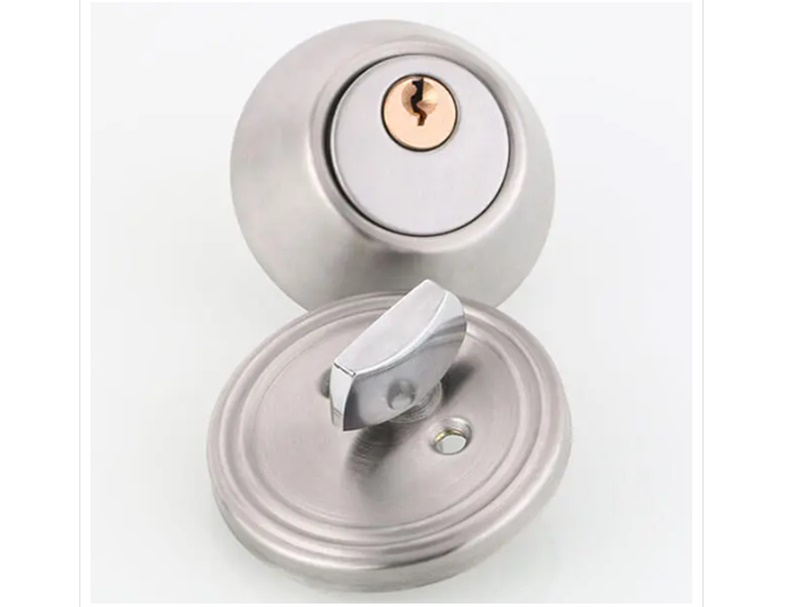
Advantages:
Single-Cylinder Deadbolt Advantages:
- Quick Access: The thumb turn mechanism allows for rapid locking and unlocking from the inside, which can be especially beneficial in emergencies.
- Simplicity: With a straightforward design, these locks are easy to install and maintain.
- Cost-Effective: Generally, single-cylinder deadbolts are less expensive than double-cylinder variants, making them more budget-friendly.
- Widely Accepted: Given their ease of use and safety during quick exits, these locks are commonly accepted and often preferred in residential settings.
Double-Cylinder Deadbolt Advantages:
- Enhanced Security: The need for a key on both sides can deter unauthorized access, especially in scenarios where glass breakage near the door is a concern.
- Deters “Reach-In” Intrusions: Intruders can’t simply break a window or glass panel and reach in to unlock the door, as a key is required on both sides.
- Prevents Easy Lock-In: In situations where someone may be locked inside a room or property against their will, the double-cylinder design can act as a deterrent since a key is needed to lock the door from the inside.
Disadvantages
Single-Cylinder Deadbolt Disadvantages:
- Security Concerns with Glass: If the door has glass panels or is near a window, an intruder could break the glass and turn the thumb lever to gain access.
- Potential Lock Picking: While all locks can be susceptible to picking, the single-cylinder’s external key mechanism might be a target for burglars skilled in lock picking or bumping.
Double-Cylinder Deadbolt Disadvantages:
- Safety Concerns: In emergencies, searching for a key to exit can be hazardous. This is especially concerning in fires or situations where rapid evacuation is crucial.
- Potential Lockout: If residents misplace the interior key, they could be locked inside their property.
- Legal Restrictions: As previously discussed, some local building and fire codes may prohibit double-cylinder deadbolts due to safety concerns.
While single-cylinder deadbolts offer convenience and are widely accepted, they might fall short in terms of security in specific scenarios. On the other hand, double-cylinder deadbolts provide enhanced security but come with potential safety risks and legal considerations.
Situations for Using
The choice between single-cylinder and double-cylinder deadbolts often hinges on a homeowner’s specific needs and the unique characteristics of the property in question. Let’s delve into the typical scenarios where each type of lock finds its most suitable application.
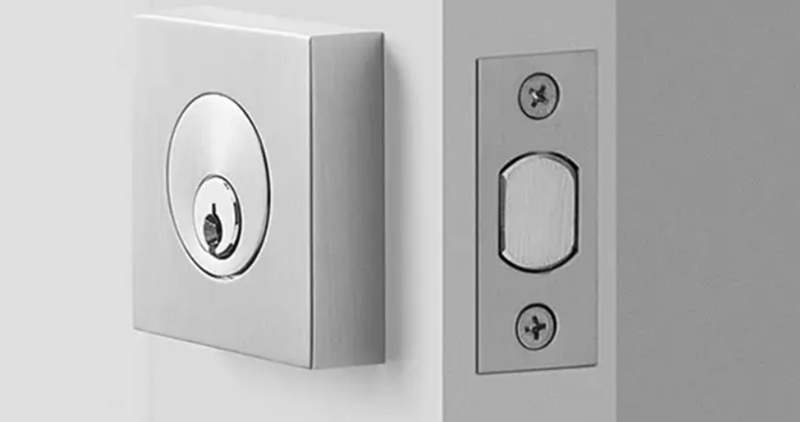
Single-Cylinder Deadbolt Using situation:
- Quick Exits: In emergencies, such as fires or other urgent scenarios, being able to exit quickly is crucial. The thumb turn mechanism in single-cylinder deadbolts allows for swift unlocking from the inside without fumbling for a key.
- Interior Doors: For doors within the home that require an added layer of security, such as a home office or a storage room, a single-cylinder deadbolt can be an ideal choice. It provides security without the inconvenience of needing a key every time you enter from another part of the house.
- Homes without Close Proximity Windows: A single-cylinder deadbolt can offer ample security if your door has no windows nearby or glass paneling. There’s minimal risk of someone breaking the glass, reaching in, and turning the thumb lever.
Double-Cylinder Deadbolt Using situation:
- Doors with Glass Panels: If your door features glass panels or has windows adjacent to the door, a double-cylinder deadbolt can be a wise choice. Even if an intruder manages to break the glass, they won’t be able to reach in and turn a thumb lever. They’d need the actual key to unlock the door.
- High-Security Areas: For areas that require an added layer of protection, such as commercial establishments or rooms that house valuable items, a double-cylinder lock can deter unauthorized access from both sides of the door.
- External Gates and Fences: A double-cylinder deadbolt can be beneficial for homes with external gates or fences that need locking. It ensures that someone can’t easily jump over the fence and unlock the gate from the inside without a key.
- Preventing “Lock-In” Scenarios: In households where there might be concerns about someone locking others inside (due to domestic issues or other reasons), a double-cylinder deadbolt requires a key to lock from the inside, adding an extra step and potentially preventing such scenarios.
However, it’s essential to note that while double-cylinder deadbolts can offer enhanced security in certain situations, they might not be suitable for all homes. In some regions, they might even be against fire safety regulations due to the potential hindrance they pose during emergency evacuations.
Economy
When considering installing or replacing deadbolts, two critical factors come into play: efficiency and the economic aspect concerning cost. Let’s delve into why single-cylinder locks are often favored in these domains.
- Lower Initial Cost: Single-cylinder deadbolts are generally less expensive than their double-cylinder counterparts. This price difference can be attributed to their simpler design and mechanism.
- Maintenance and Replacement: Given their simpler design, single-cylinder locks often have fewer components that can malfunction. This can reduce maintenance costs and longer intervals before replacements are needed.
- Wider Availability: Due to their popularity and widespread use, single-cylinder deadbolts are readily available in hardware stores and online platforms. This abundance often translates to competitive pricing and a broader range of budget design options.
While single-cylinder locks offer notable advantages in efficiency and economy, it’s essential to remember that the choice between single and double-cylinder deadbolts should not solely be based on these factors.
How to Choose?
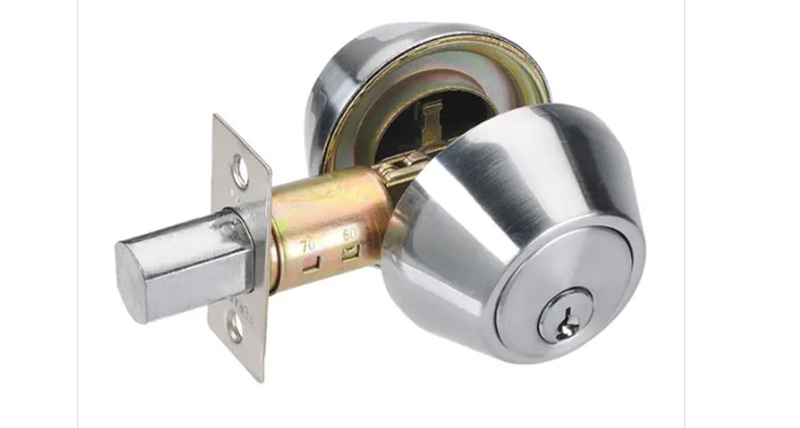
Selecting the appropriate deadbolt is more than just a matter of security; it’s about ensuring the lock aligns with the property’s specific needs, layout, and circumstances. Here are some key factors to consider when deciding between single and double-cylinder deadbolts:
- Door Design and Proximity to Windows: If your door has glass panels or windows close to the door, a double-cylinder deadbolt might be more suitable to prevent “reach-in” intrusions. However, for doors without such vulnerabilities, a single-cylinder deadbolt might suffice.
- Safety and Emergency Exits: Consider the ease of exit in emergencies. If rapid evacuation might be necessary, a single-cylinder deadbolt with its thumb turn mechanism can be more advantageous.
- Local Regulations and Building Codes: Always check local building and fire safety codes. Some jurisdictions might restrict or prohibit double-cylinder deadbolts due to potential evacuation concerns.
- Frequency of Use: The convenience of a single-cylinder deadbolt might be preferable for frequently used doors. However, a double-cylinder option might be more appropriate for doors that are seldom used or meant to be more secure.
- Security Concerns and Past Incidents: If the property has been a target of break-ins or has heightened security concerns, a double-cylinder deadbolt can offer an added layer of protection.
- Budget and Cost: Single-cylinder deadbolts are generally more cost-effective than double-cylinder counterparts. Consider your budget and the potential long-term savings from reduced maintenance or enhanced security.
- Aesthetics and Door Hardware Compatibility: Ensure that the chosen deadbolt complements the overall aesthetics of the door and is compatible with other door hardware, such as handles or knobs.
- User Accessibility: Consider the residents of the property. For elderly individuals or those with disabilities, a single-cylinder deadbolt might be easier to operate due to the thumb turn mechanism.
- Insurance Requirements: Some insurance providers might have specific requirements or recommendations regarding the types of locks installed. Ensure that your choice aligns with these stipulations to avoid potential policy complications.
- Professional Consultation: When in doubt, consult a locksmith or security professional. They can provide insights tailored to your property’s specific layout and needs.
In conclusion, deciding between a single and double-cylinder deadbolt should be holistic, considering various factors ranging from security to convenience. By assessing each factor in light of your property’s unique circumstances, you can make an informed choice that ensures safety and ease of use.
Conclusion
Deadbolts are a cornerstone of home security, offering a robust defense against potential intrusions. However, choosing between single and double-cylinder deadbolts is not merely about picking a lock but understanding a property’s unique needs, challenges, and circumstances.
With their thumb-turn mechanism, single-cylinder deadbolts offer convenience and rapid access, which is especially vital in emergencies. They’re commonly found in residential settings, apartments, and senior living facilities due to their user-friendly design. However, their vulnerability, especially near glass panels or windows, is a concern.
On the other hand, double-cylinder deadbolts provide an enhanced layer of security, requiring a key on both sides. They’re particularly suited for properties with glass-paneled doors, commercial establishments, and homes in high-risk areas. Yet, their potential safety concerns in emergencies and legal restrictions in certain jurisdictions cannot be overlooked.
In making a decision, one must balance security and convenience, always keeping in mind the property’s specific layout, local regulations, and the daily needs of its occupants. It’s also beneficial to consult with security professionals or locksmiths to tailor the choice to the property’s unique requirements.


